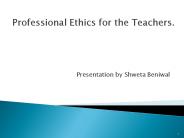Professional Ethics - PowerPoint PPT Presentation
1 / 19
Title:
Professional Ethics
Description:
As mentioned earlier, this discussion is based on the book 'Professional Ethics ... This is why whenever an ethical situation arises, we must devote some time to it ... – PowerPoint PPT presentation
Number of Views:28
Avg rating:3.0/5.0
Title: Professional Ethics
1
Professional Ethics
- In the last class, we discussed ethics in
general. Today, we will start a discussion on
professional ethics. - As mentioned earlier, this discussion is based on
the book Professional Ethics for Natural
Resource and Environmental Managers A Primer by
Lloyd Irland (2007) - First, let me ask the question, what is a
profession? - This may sound like an odd question, but what are
the characteristics that make something a
profession?
2
- An obvious related question is, what are the
differences between an amateur and a
professional? - Is it just doing something well and being able to
do it for money? - Is a professional athlete a professional in the
same sense as a physician? - Obviously, there are some differences between
these two types of professionals.
3
(No Transcript)
4
(No Transcript)
5
- Professional ethics is a professional skill just
like the more technical ones. As a skill, it must
first be introduced through training, then it
must be cultivated over time.
6
(No Transcript)
7
- But is everything always as black and white as
right and wrong? - Of course not! And we see examples of that even
in our legal system. - The law makes a distinction between first and
second degree murder, for example. Even though
the victim is just as dead either way. - This is why whenever an ethical situation arises,
we must devote some time to it and carefully
decide how to proceed.
8
- So, how should we proceed on professional ethical
situations? - A very important step is to define the nature of
the problem. - This may not be as simple as it sounds.
- Some problems may not be of ethical nature at
all. - Often these problems may be caused by simple
disagreements, or differing views (political,
philosophical, etc.) on existing policies. - In such cases we may make these problems more
complicated by defining them as ethical problems.
9
(No Transcript)
10
(No Transcript)
11
- Recall the four questions to ask yourselves in an
ethical situations that we talked about in the
last class. - They can be really helpful in this process!
- What does my conscience say?
- What would it be like if everyone did this?
- How would it feel if everyone knew about this?
- How would I feel about this tomorrow?
12
SAF Code of ethics
- What is the purpose of the SAF Code of Ethics?
- The SAF defines it as follows
- Clarify core values.
- Guide professional conduct for the benefit of
society. - Inspire members to exceed minimum standards when
possible.
13
- The Code begins with a Preamble which is
basically a broad statement of principle. - The preamble states the professions mission of
forest stewardship and emphasizes the importance
of forests to the society. - It states comprehensive and ambitious goals for
the code including protecting and serving
society, fostering long term stewardship, and
supporting good business relationships.
14
- The actual code contains six points which are
stated as pledges. - These six points are
- 1 Foresters have a responsibility to manage
land for both current and future generations. We
pledge to practice and advocate management that
will maintain the long-term capacity of the land
to provide the variety of materials, uses, and
values desired by landowners and society.
15
- 2 Society must respect forest landowners'
rights and correspondingly, landowners have a
land stewardship responsibility to society. We
pledge to practice and advocate forest management
in accordance with landowner objectives and
professional standards, and to advise landowners
of the consequences of deviating from such
standards. - 3 Sound science is the foundation of the
forestry profession. We pledge to strive for
continuous improvement of our methods and our
personal knowledge and skills to perform only
those services for which we are qualified and in
the biological, physical, and social sciences to
use the most appropriate data, methods, and
technology.
16
- 4 Public policy related to forests must be
based on both scientific principles and societal
values. We pledge to use our knowledge and skills
to help formulate sound forest policies and laws
to challenge and correct untrue statements about
forestry and to foster dialogue among foresters,
other professionals, landowners, and the public
regarding forest policies. - 5 Honest and open communication, coupled with
respect for information given in confidence, is
essential to good service. We pledge to always
present, to the best of our ability, accurate and
complete information to indicate on whose behalf
any public statements are made to fully disclose
and resolve any existing or potential conflicts
of interest and to keep proprietary information
confidential unless the appropriate person
authorizes its disclosure.
17
- 6 Professional and civic behavior must be based
on honesty, fairness, good will, and respect for
the law. We pledge to conduct ourselves in a
civil and dignified manner to respect the needs,
contributions, and viewpoints of others and to
give due credit to others for their methods,
ideas, or assistance.
18
- Lets have a short class discussion on what each
of these points are trying to emphasize.
19
- 1 Land ethic.
- 2 Importance of clients rights.
- 3 Importance of science.
- 4 Role of the profession in public policy.
- 5 Importance of communication and
confidentiality. - 6 Civil and dignified behavior.































